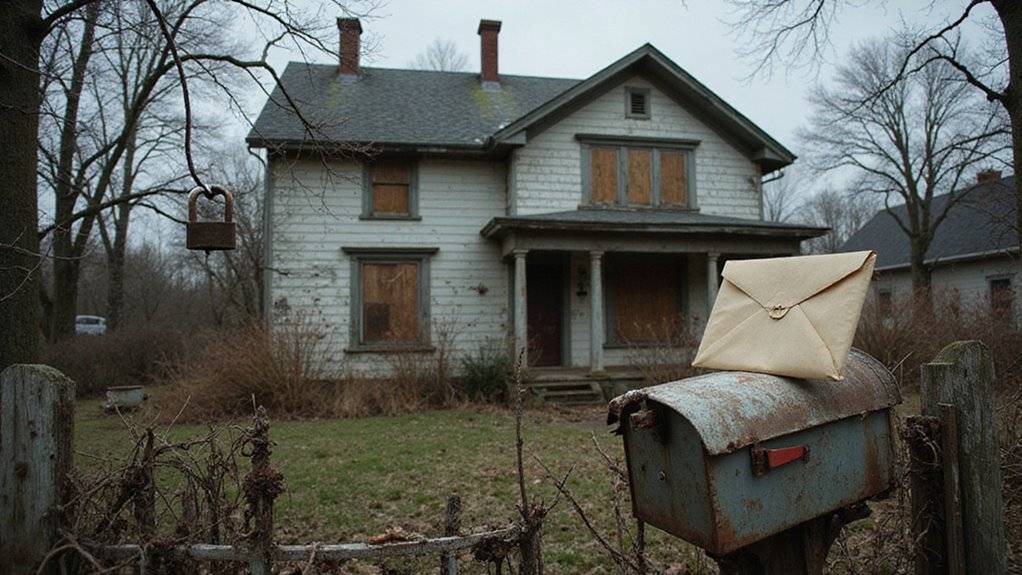Selling an abandoned property can be tricky. Many people inherit old homes only to find legal problems like unpaid taxes or unresolved liens. These issues make selling the property much harder than expected.
Unresolved legal claims, missing ownership papers, or hidden code violations can delay or block a sale. If you miss required disclosures, you could even face lawsuits or costly fines. These risks grow if third parties suddenly claim a stake in the home.
To sell an abandoned property, you must clear all legal issues, settle debts, and follow all municipal rules. You should also disclose any problems to buyers and get professional legal help if needed.
This way, you can avoid future legal trouble. This blog will guide you through the legal steps to safely sell an abandoned property.
Key Takeaways
- Confirm clear legal ownership and resolve any title issues, including missing heirs or incomplete property records, before selling.
- Identify and settle outstanding liens, unpaid taxes, or mortgages to prevent delays or disputes during the transaction.
- Address all code violations, fines, and municipal compliance issues prior to listing the property for sale.
- Disclose all known defects and environmental hazards to buyers to avoid potential lawsuits or sale cancellations.
- Ensure the property complies with zoning, registration, and security ordinances to avoid legal and financial penalties.
Determining Legal Ownership

To sell an abandoned property, you must first prove you own it. This means you need clear and legal ownership. Without this, you cannot sell the property.
Start by checking deeds, mortgages, and tax records to see who owns the property. If the owner is dead or missing, search for heirs or people with an interest. Only the real owner or their legal agent can sell the property. Before proceeding with a sale, it’s important to be aware of any unpaid taxes or liens that could affect the transaction.
You must also check for any claims, liens, or disputes against the property. These issues can stop a sale or cause legal problems. If you find any, resolve them before trying to sell.
A property valuation and market analysis can help you know the property’s value. These steps may also show problems that could affect the sale. If you miss these checks, you risk selling the property illegally.
If the property is held under a land contract, you must review the agreement for any restrictions or requirements that could impact your ability to transfer ownership.
Clearing Title and Deed Issues
You must resolve all title and deed issues before you can sell a property. Title searches help find problems like claims, missing signatures, or gaps in ownership. If any issues are found, you must fix them to give a clear title to the buyer. For sellers in Florissant, working with trusted local buyers can streamline the sale and ensure these legal hurdles are handled efficiently.
Some issues may need legal documents or even a court order to fix. Properly recording all deed transfers protects you and future buyers from possible disputes. If you skip this step, the sale could be delayed or cancelled.
When selling a property as-is, sellers often benefit from zero fees or commissions to simplify the transaction and avoid extra costs.
Here are common title and deed problems and ways to fix them:
| Issue | Legal Remedy |
|---|---|
| Missing deed transfer | Record a corrective deed |
| Break in chain | File a quiet title action |
| Unreleased interest | Get a release or satisfaction |
| Forged signature | Seek a court correction |
| Unrecorded inheritance | Start probate proceedings |
Addressing Outstanding Liens and Mortgages
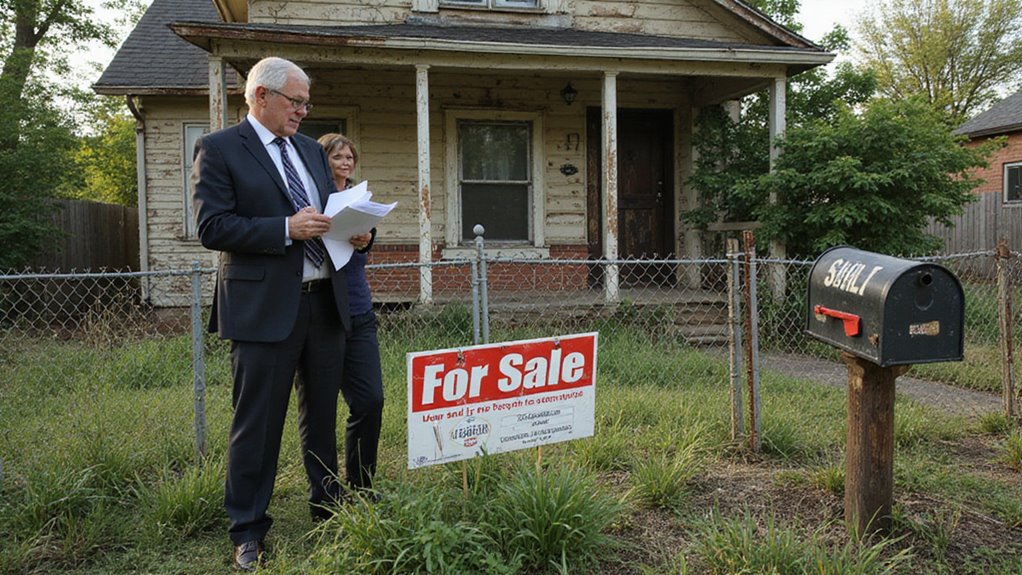
You must clear all liens and mortgages before selling an abandoned property. These claims can prevent you from transferring a clean title. If you do not resolve them, buyers or title companies may refuse to proceed.
A title search will show any liens or unpaid mortgages. These may include mechanic’s liens or court judgments. You must pay off or negotiate these debts before closing. Working with a local title company can help ensure that all liens are properly identified and addressed before finalizing the sale.
Mistakes sometimes occur in public records. If a lien is recorded by error, you should ask a lawyer to correct the deed. Prompt action helps avoid delays and legal problems.
If you address these issues early, your sale will go smoothly. Buyers want proof that all debts are settled. This also helps you avoid future disputes.
If the abandoned property was ever used as a primary residence, you may qualify for a capital gains tax exclusion on profits from the sale, provided you meet certain IRS residency requirements.
Handling Unpaid Property Taxes
You must identify any tax liens recorded against the property, as these encumbrances take priority over most other claims. You’ll need to settle all outstanding property tax balances before transferring clear title to a buyer. Failure to address unpaid taxes can delay or jeopardize the entire sale process due to statutory redemption rights and potential tax foreclosure actions.
In many cases, unpaid property taxes can significantly reduce your net proceeds from an as-is sale, as buyers often factor these costs into their offers when purchasing distressed properties. If you’re facing unresolved liens or complex title issues, working with a family-owned local business experienced in handling escrow and offering fair, quick cash offers can help streamline the process and avoid further legal complications.
Identifying Tax Liens
Tax liens can affect the sale and ownership of a property. If a property has unpaid taxes, a tax lien may exist. Always check for tax liens before buying an abandoned property.
Start by getting the latest tax assessment from the county assessor’s office. This document will show the property’s value and any unpaid taxes. If there are delinquent taxes, a tax lien may have been placed on the property.
Check public records to confirm if there are any outstanding tax liens. Tax liens usually have priority over other claims on a property. If you miss a lien, you could face delays or legal problems.
Reviewing the property’s tax history can help you avoid issues. This step ensures a clear transaction for both buyers and sellers. If you find a lien early, you can address it before moving forward.
Settling Outstanding Balances
Outstanding property tax balances must be settled before ownership can legally transfer. Delinquent taxes create a claim on the title. If you ignore them, you risk future legal trouble or foreclosure.
Start by finding the property’s current market value. This helps you decide how to handle the estate or negotiate with tax authorities. Contact the local tax office to get a statement of what you owe, including penalties.
Pay off these tax liens as soon as possible. If allowed, you can try to negotiate for a lower amount. Once taxes are paid, you can transfer the property with a clear title.
Impact on Sale Process
Unpaid property taxes make selling an abandoned property difficult. Tax liens are attached to the property and must be settled before sale. Buyers may walk away if the title is not clear.
Tax liens take priority over most other debts on the property. Sellers must pay these taxes or negotiate with the local tax office. If taxes remain unpaid, the sale may be delayed or canceled.
Unpaid taxes can lower the property’s value. Buyers often reduce their offers to cover the cost of the liens. Resolving these issues helps make the property more appealing to buyers.
Sellers should clear all unpaid property taxes before listing the property. This ensures a smooth sale and avoids problems at closing. If taxes are resolved, the sale process is faster and simpler.
Managing Code Violations and Fines
You’ll need to identify all outstanding code violations by reviewing municipal records and inspection reports before listing the property. Unaddressed violations and accrued fines can impede a sale or trigger legal liabilities for both you and the buyer. It’s essential to engage with local authorities to negotiate reduced penalties or establish compliance agreements, ensuring a smoother transaction.
If you’re concerned about selling houses as-is, reputable local buyers can help purchase properties regardless of code violations or repairs needed. Working with trusted local title companies can also streamline the process and help resolve any outstanding legal or paperwork issues related to code violations.
Identifying Outstanding Code Violations
To sell an abandoned property smoothly, first identify all outstanding code violations. Check city records for unresolved issues or enforcement actions. Confirm if there are any current or past fines.
A recent property survey can show unapproved structures or changes. Make sure all repairs or upgrades have the required permits. Missing permits can mean there are code violations.
Ask the local building department for official documents about any violations. These documents will list what needs fixing and by when. If there are unpaid fines, liens could block the sale.
If you find and fix every code issue, you lower legal risks. This preparation helps you complete the sale quickly and legally.
Negotiating Fines With Authorities
Negotiating fines with authorities means talking to the city or local office about your code violations. You should first ask for a detailed list of all fines and extra fees. This helps you understand exactly what you owe.
If you want to lower your fines, explain any good reasons, such as recent repairs or the property being empty. Authorities may reduce or remove penalties if you show you are trying to fix the issues. Always keep written records of your talks and agreements.
Quick and clear communication with the authorities can lower your costs. If you settle fines before selling, your transaction will be smoother. Make sure you follow all city rules before closing the sale.
Navigating Zoning Restrictions
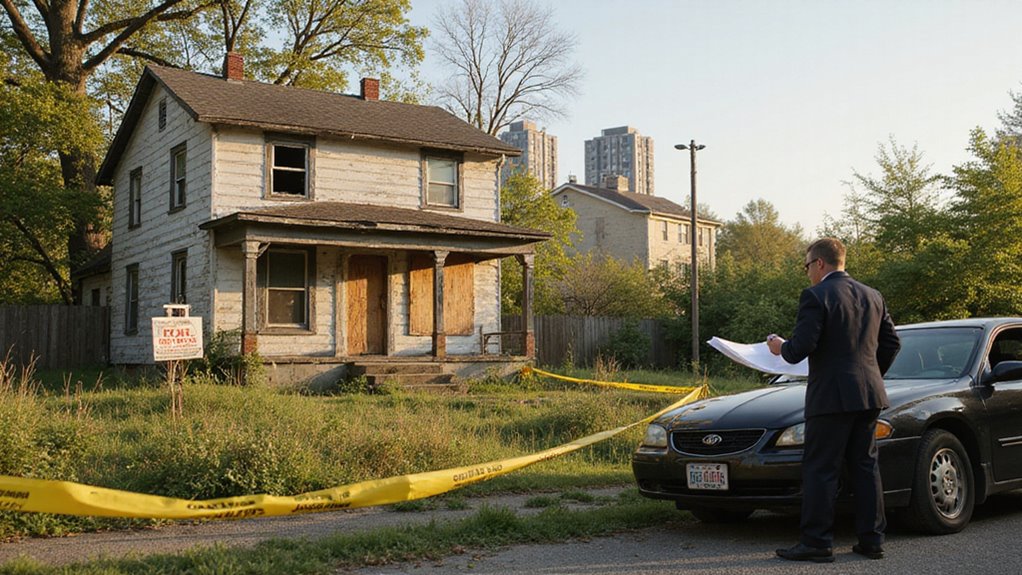
Zoning laws set clear rules for how abandoned properties can be used or sold. These rules limit what activities are allowed on the land. If you ignore zoning, you may face delays, legal problems, or fines. In addition to zoning, sellers should be aware that proper documentation of issues like asbestos or other hazardous materials may be required during disclosure, as failing to do so could result in legal penalties.
Property owners should always check the current zoning classification before selling. Some areas may have extra rules called overlay districts. If the property’s use or buildings do not match zoning rules, you must fix this before selling.
If your plans or a buyer’s plans do not fit zoning rules, you must get special permission. This might mean applying for a variance or a conditional use permit. Buyers will always check if a property meets zoning requirements, so it’s important to prepare in advance.
Working with local St. Charles County real estate market experts can help you navigate zoning restrictions and ensure a smooth, compliant sale.
Dealing With Environmental Hazards
Environmental hazards can cause major problems when selling abandoned property. Sellers must check for contamination in soil, water, or building materials. If hazards exist, these issues must be addressed before the sale.
Mold, asbestos, and other environmental disclosure requirements can add legal complexity and require professional attention before a transaction can proceed. Environmental hazards in abandoned property can complicate sales; sellers must check for contamination and address any issues before selling.
Federal and state laws can hold you responsible for cleanup, even if you did not cause the problem. Failure to report known hazards can lead to fines or lawsuits. Disclosure of any risks is required by law.
A Phase I Environmental Site Assessment should be done before listing the property. If contamination is found, cleanup may be necessary before transfer. Buyers might ask for proof of cleanup or legal protection.
It’s also important to address any existing mortgage on the property, since legal and financial responsibilities remain even if the property is abandoned.
Complying With Vacant Property Ordinances
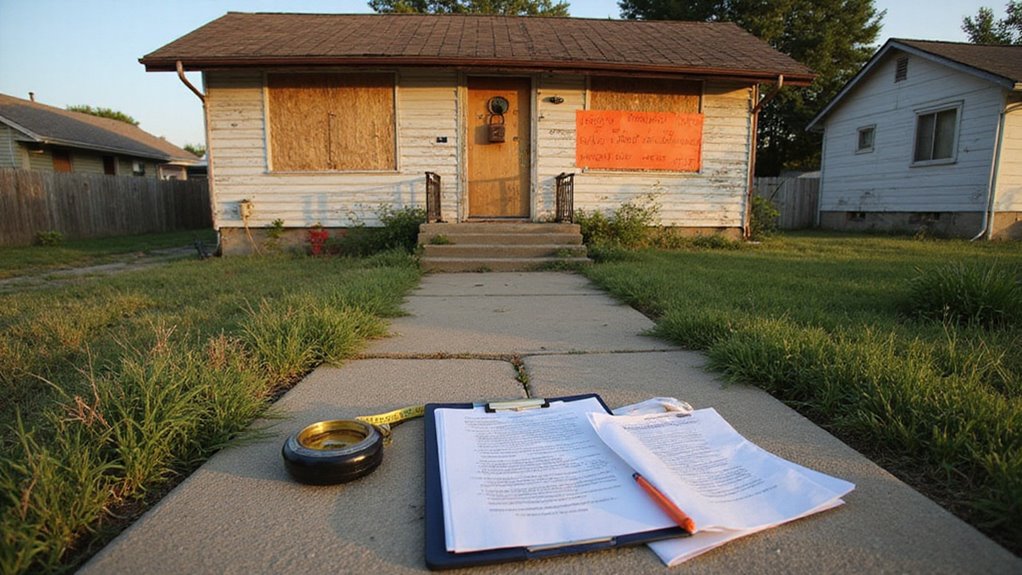
Many cities have special rules for empty properties. You must follow vacant property ordinances before selling an abandoned property. These rules help prevent safety and maintenance problems.
Most ordinances require you to register the property with local officials. If you don’t do this, you could face fines or delays. You are also responsible for meeting all maintenance and inspection rules.
Check for any deadlines or renewal dates for property registration. Make sure to keep the yard clean and repair any damage. Always keep records of inspections and the property’s vacant status.
Following these rules protects your rights as a seller. It can also help you avoid legal trouble and make the sale go more smoothly. If you stay compliant, the process will be easier. Working with trusted local home buyers who understand these ordinances can also help ensure a stress-free and compliant sale.
Securing the Property Against Trespassers
You must secure a vacant property to prevent trespassers from entering. If someone gets hurt or property is damaged, you could be held responsible. Taking basic steps can protect you from legal trouble.
Visible security cameras can discourage people from entering without permission. If legal issues arise, camera footage may help your case. Fences and gates also show that entry is not allowed.
Check locks, windows, and doors often to keep the property secure. If you skip these steps, you might face fines or be forced to fix the problems. Taking action early helps protect your property and reduces risk.
Notifying Interested Parties and Heirs
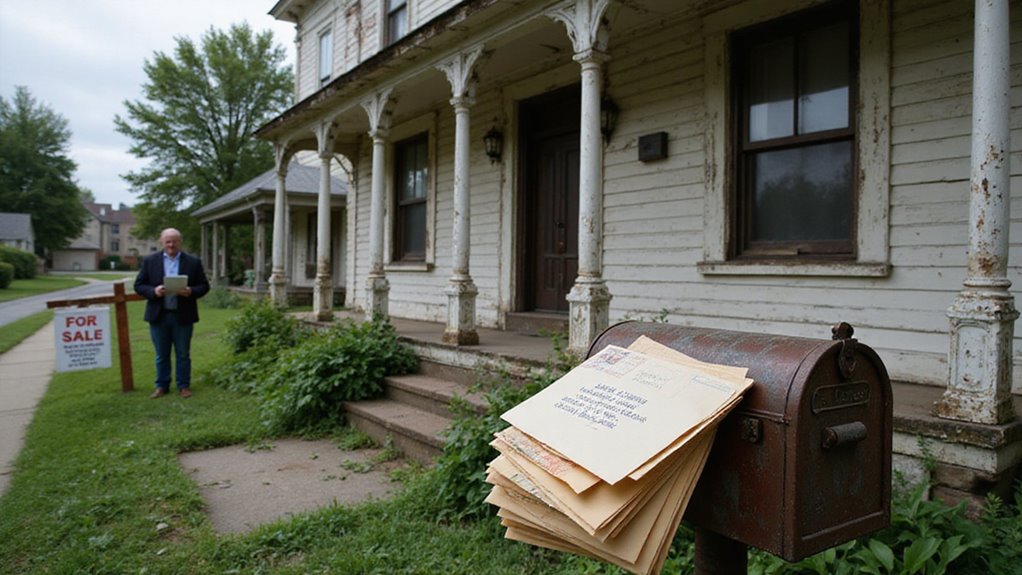
You must tell all interested people and heirs before selling an abandoned property. This step is important because missing someone can cause legal problems or stop the sale. If you do not notify everyone, the sale could be cancelled later.
Heirs, lienholders, and co-owners might have legal rights to the property. A title search or probate records can help you find these people. If some heirs are unknown, you must still try to notify them.
Heirs, lienholders, and co-owners may have rights to an abandoned property, so always attempt to identify and notify them before a sale.
Laws often require public notices and direct mail to reach possible owners. These actions help make sure the property is valued correctly and advertised to the right people. If you follow these rules, your sale is less likely to face challenges.
If you keep good records of each notice you send, you can prove you followed the law. Always check the time limits for sending notices. If you meet all legal steps, you protect your interest in the sale.
Understanding Eminent Domain Risks
Eminent domain means the government can take private property for public use if they pay fair compensation. If your property is abandoned and near new projects, the government might want to take it. This risk can affect your plans to sell the property.
Buyers may lose interest or offer less money if there is a chance of seizure. If you see any city plans or changes in zoning, you should look into them. A lawyer can help you review any notices or possible actions from the government.
If you understand these risks early, you can plan your sale better. Taking action early helps you protect your interests during the selling process. If you have questions, always seek advice from a real estate professional.
Disclosing Property Defects to Buyers
You are legally required to tell buyers about any property defects you know about. This is not just ethical; it is also a law in most places. If sellers hide problems, they may face lawsuits or lose the sale.
Defects can be obvious, like broken walls, or hidden, like mold or pests. Sellers should also mention old wiring or plumbing if they know about them. If you are unsure, it is safer to disclose the issue.
Sellers should list all known defects, even if they learned about them from an inspection. Any repair records or reports should be shared with buyers. Using official disclosure forms helps you follow the law and protect yourself.
Full disclosure protects both the buyer and the seller. If everyone is honest, there are fewer chances for future disputes. This helps the sale go smoothly.
Working With Local Authorities and Inspections
To sell an abandoned property, you must follow all municipal rules. Contact local authorities first to check for code violations or zoning problems. If officials find issues, these must be fixed before selling.
You should work with inspectors to review the property. Inspectors can spot safety hazards or other legal problems. Their reports help you prepare for buyer questions and title insurance needs.
If the inspection finds violations, you must fix them before transfer. Keep records of repairs and inspections for future reference. Local officials can help you get any required clearance certificates.
Clearance certificates show the property meets local standards. These documents help speed up the sale process. Following all rules protects you from legal and financial risks.
Engaging Legal and Real Estate Professionals
You should hire legal and real estate experts when selling an abandoned property. These professionals help you manage legal and sales steps. Their support can prevent problems and make the process smoother.
Legal professionals check the property title and resolve any claims or debts. They make sure you follow all laws before the sale. Clear title transfer reduces the risk of future disputes.
Real estate agents assess the property value using current market trends and property details. They create marketing plans to attract serious buyers. Effective marketing can help you get the best possible price.
If you work with these experts, your sale is more likely to be safe and efficient. Their help ensures each part of the process is handled properly.
Conclusion
If you plan to sell an abandoned property, you must prepare for legal and financial hurdles. Sellers may face title issues, liens, and city code violations. If you ignore proper steps, you risk legal trouble and financial losses.
If you want to avoid these complications, you should seek professional help. We buy houses for cash, which allows you to skip many of these legal headaches. If you work with experienced buyers, you can sell your property faster and with less stress.
If you are ready to sell your abandoned property, we can help. Freedom Path Investors will guide you through each step and handle the paperwork. Contact us today to get a fair cash offer and close with confidence.

